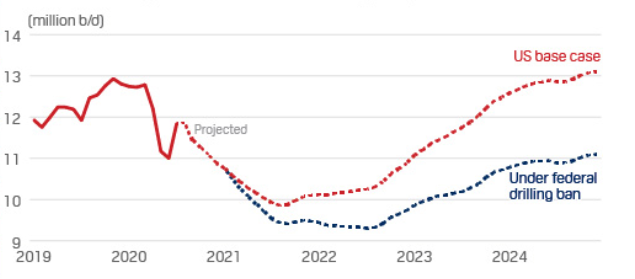Cheap Oil And The Trump Presidency: A Critical Analysis Of Energy Policy

Table of Contents
The Shale Oil Revolution and its Contribution to Lower Prices
The era of cheap oil during the Trump presidency was significantly influenced by the burgeoning shale oil revolution. This domestic energy boom dramatically altered the global oil market and contributed to lower prices.
Increased Domestic Production
The Trump administration's policies, while not solely responsible, fostered an environment conducive to increased shale oil extraction. This involved:
- Increased drilling permits: The administration streamlined the permitting process for oil and gas exploration on federal lands, leading to a surge in drilling activity.
- Technological advancements in fracking: Continuous innovation in hydraulic fracturing techniques made shale oil extraction more efficient and cost-effective.
- Reduced regulatory burdens: Rollbacks of environmental regulations, particularly those related to methane emissions and water usage, lowered the cost of shale oil production.
Data from the Energy Information Administration (EIA) reveals a sharp increase in US crude oil production during this period, directly correlating with a decline in global oil prices. This surge in American energy production significantly impacted the global supply and demand dynamics.
Impact on OPEC and Global Oil Markets
The increased US shale oil production significantly disrupted the strategies of OPEC (Organization of the Petroleum Exporting Countries) nations. Facing increased competition, OPEC members initially responded by maintaining or even increasing their own production, leading to:
- OPEC's response to increased US production: A period of fluctuating oil prices as OPEC attempted to adjust to the new market reality.
- Price wars: Occasional price wars erupted as OPEC members competed for market share with the burgeoning US shale oil industry.
- Shifting global market dynamics: The US transitioned from a net importer of oil to a significant exporter, altering the balance of power in the global oil market.
Geopolitical factors, including strained relations between the US and some OPEC members like Iran, also played a role in shaping oil prices during this period.
The Trump Administration's Energy Policy and its Effects
The Trump administration's energy policy was characterized by a strong emphasis on fossil fuels and deregulation, with the stated goal of achieving American energy independence.
Emphasis on Fossil Fuels and Deregulation
The administration's pro-fossil fuel stance manifested in several key policy decisions:
- Withdrawal from the Paris Agreement: The US withdrawal from the Paris Agreement on climate change signaled a rejection of international cooperation on climate mitigation and signaled a preference for domestic fossil fuel production.
- Rollbacks of environmental regulations: Numerous environmental regulations were rolled back, impacting air and water quality and potentially increasing greenhouse gas emissions. Examples include weakening fuel efficiency standards and relaxing restrictions on methane emissions from oil and gas operations.
- Support for coal mining: The administration actively supported the coal industry, despite its declining competitiveness compared to natural gas and renewable energy sources.
These policies aimed to reduce costs and stimulate domestic energy production but significantly impacted the environment.
Promoting Energy Independence
A key aim of the Trump administration was to achieve energy independence for the US. This involved:
- Import reduction: Increased domestic production led to a decrease in US oil imports.
- Increased domestic energy consumption: The readily available and relatively cheap oil fueled increased domestic energy consumption.
- Reliance on fossil fuels: The policy focused heavily on fossil fuels, potentially hindering the development of renewable energy sources.
While the US reduced its reliance on foreign oil imports, the heavy dependence on fossil fuels raised questions about long-term energy security and vulnerability to future price fluctuations. A diverse energy portfolio, including renewable sources, is often cited as a more robust strategy for achieving true energy independence.
Economic and Environmental Consequences of Cheap Oil
The era of cheap oil under the Trump administration had both economic benefits and drawbacks, alongside significant environmental consequences.
Economic Benefits and Drawbacks
Cheap oil delivered some clear economic benefits:
- Impact on consumer spending: Lower gasoline prices boosted consumer spending and disposable income.
- Job creation in the energy sector: The shale oil boom created numerous jobs in oil and gas extraction, refining, and transportation.
However, there were also downsides:
- Investment in renewable energy sources: The emphasis on fossil fuels potentially diverted investment away from renewable energy research and development.
- Job creation and losses across different sectors: While jobs were created in the fossil fuel sector, others might have been lost in industries struggling to compete with cheap energy. The overall net economic impact remains a complex topic of debate.
Environmental Impact of Increased Fossil Fuel Production
The increased production and consumption of fossil fuels during this period had significant environmental consequences:
- Increased carbon emissions: The burning of oil and gas for energy significantly contributed to increased greenhouse gas emissions, exacerbating climate change.
- Impact on air and water quality: Oil and gas extraction and processing can lead to air and water pollution, impacting public health and ecosystems.
- Contribution to climate change: The increased emissions from fossil fuel production further contributed to global warming and its associated risks.
Numerous scientific reports, including those from the IPCC (Intergovernmental Panel on Climate Change), highlight the detrimental impacts of continued reliance on fossil fuels.
Conclusion
The period of cheap oil under the Trump presidency resulted from a complex interplay of factors, including the shale oil revolution and the administration's pro-fossil fuel policies. While lower oil prices provided short-term economic benefits such as reduced consumer costs and job growth in certain sectors, the long-term consequences, particularly the environmental impacts and potential vulnerabilities of a fossil fuel-dependent economy, require careful consideration. The administration's emphasis on deregulation and withdrawal from international climate agreements raised serious concerns about environmental sustainability and the potential for long-term economic instability tied to fluctuating energy prices. Understanding the lasting effects of cheap oil and the need for a responsible energy future requires further exploration. Continue learning about effective energy policies and their impact by [link to relevant resource].

Featured Posts
-
 Esta Adaptacao De Quadrinhos De Stallone Merece Mais Reconhecimento
May 12, 2025
Esta Adaptacao De Quadrinhos De Stallone Merece Mais Reconhecimento
May 12, 2025 -
 Crazy Rich Asians Henry Golding Updates On Cast Reunions And Tv Adaptation
May 12, 2025
Crazy Rich Asians Henry Golding Updates On Cast Reunions And Tv Adaptation
May 12, 2025 -
 Convincing Win For Tennessee 12 1 Defeat Of Indiana State
May 12, 2025
Convincing Win For Tennessee 12 1 Defeat Of Indiana State
May 12, 2025 -
 Jessica Simpsons Kontroversiella Uttalande Om Ormsperma Fakta Och Reaktioner
May 12, 2025
Jessica Simpsons Kontroversiella Uttalande Om Ormsperma Fakta Och Reaktioner
May 12, 2025 -
 La Maison De Campagne De Chantal Ladesou Un Havre De Paix Pour Elle Et Ses Proches
May 12, 2025
La Maison De Campagne De Chantal Ladesou Un Havre De Paix Pour Elle Et Ses Proches
May 12, 2025
